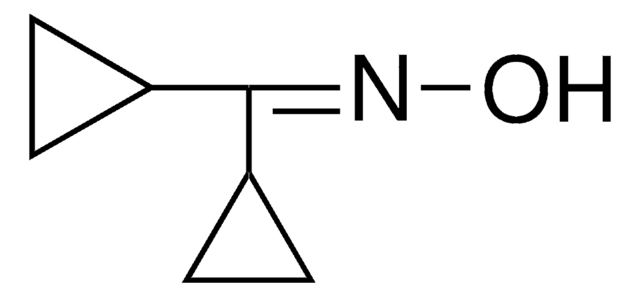125512
Cyclopropyl phenyl ketone
97%
Synonym(s):
Benzoylcyclopropane
Sign Into View Organizational & Contract Pricing
All Photos(1)
About This Item
Linear Formula:
C6H5COC3H5
CAS Number:
Molecular Weight:
146.19
Beilstein:
1860145
EC Number:
MDL number:
UNSPSC Code:
12352100
PubChem Substance ID:
NACRES:
NA.22
Assay:
97%
Recommended Products
vapor density
5 (vs air)
Quality Level
Assay
97%
refractive index
n20/D 1.553 (lit.)
bp
121-123 °C/15 mmHg (lit.)
mp
7-9 °C (lit.)
density
1.058 g/mL at 25 °C (lit.)
SMILES string
O=C(C1CC1)c2ccccc2
InChI
1S/C10H10O/c11-10(9-6-7-9)8-4-2-1-3-5-8/h1-5,9H,6-7H2
InChI key
PJRHFTYXYCVOSJ-UHFFFAOYSA-N
Looking for similar products? Visit Product Comparison Guide
Application
Cyclopropyl phenyl ketone was used to prepare α-cyclopropylstyrene by the Wittig reaction in dimethyl sulfoxide. It was used as starting reagent during the (Z)-titanium enolate formation from cyclopropyl ketones via TiCl4-n-Bu4NI-induced ring opening reaction.
Storage Class Code
10 - Combustible liquids
WGK
WGK 3
Flash Point(F)
194.0 °F - closed cup
Flash Point(C)
90 °C - closed cup
Personal Protective Equipment
dust mask type N95 (US), Eyeshields, Gloves
Choose from one of the most recent versions:
Already Own This Product?
Find documentation for the products that you have recently purchased in the Document Library.
Customers Also Viewed
Cyclopropyl substituent effects on acid-catalyzed hydration of alkenes. Correlation by σ+ parameters.
Oyama K and Tidwell TT.
Journal of the American Chemical Society, 98(4), 947-951 (1976)
Enolate formation from cyclopropyl ketones via iodide-induced ring opening and its use for stereoselective aldol reaction.
Han Z, et al.
Tetrahedron, 57(6), 987-995 (2001)
C Zimmermann et al.
Physical chemistry chemical physics : PCCP, 22(5), 2870-2877 (2020-01-09)
The two hydrogen bond solvation sites exhibited by the carbonyl group in acetophenone are influenced by alkylation of the methyl group in both the acetophenone and in the prototype solvent methanol, largely due to London dispersion forces. Phenyl docking and
Our team of scientists has experience in all areas of research including Life Science, Material Science, Chemical Synthesis, Chromatography, Analytical and many others.
Contact Technical Service










